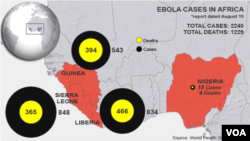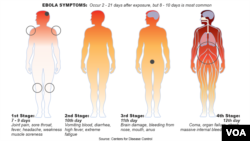The World Health Organization said another 84 people have died in West Africa as a result of the Ebola virus, bringing the death toll from the epidemic to 1,229.
The U.N. health agency on Tuesday announced the number of confirmed and likely infections has risen to 2,240, including 113 new cases reported late last week.
The majority of the new deaths were in Liberia, where authorities are struggling to contain the virus.
Between Aug. 14-16, Liberia recorded 53 new deaths, followed by Sierra Leone, with 17, and Guinea, with 14.
The Liberian government said it has accounted for all 37 suspected Ebola patients who fled an isolation center in the capital, Monrovia, when it was attacked and looted by armed men Sunday.
The information ministry said there was a "misunderstanding" among nearby residents who thought the center was bringing in Ebola victims from the rest of the country.
The incident raised fears that the fleeing patients could widen the contagion. Liberia sent police to track down the fugitive suspected cases.
The medical aid group Doctors Without Borders said it has opened a new 120-bed Ebola management facility in Monrovia. Much of the city's established health care system has shut down because of doctors and other personnel's fears of Ebola.
3 health workers recovering
Liberia's government also reported the improving health of three Ebola-infected health care workers who received the experimental drug Zmapp.
Medical professionals treating the three workers reported they are showing "very positive signs of recovery" and are making "remarkable" progress, the government said.
The drug, produced by the American company Mapp Biopharmaceutical, has not been formally tested. It is not known if the health care workers' improvement is a result of the treatment.
The outbreak in four West African countries – Guinea, Sierra Leone, Liberia and Nigeria – is the biggest Ebola epidemic to date.
Ebola Virus: How to Prevent Spreading the Disease
Ebola Virus: How to Prevent Spreading the Disease
- Avoid physical contact with people showing symptoms: continuous high fever, red eyes, vomiting and stomach ache.
- Wash hands thoroughly and frequently, including under the fingernails. Use soap and clean water; use hand sanitizer if soap is not available.
- Use gloves when taking care of infected patients.
- Avoid contact with raw meat; cook all animal food and by-products thoroughly.
- Avoid bush meat; avoid buying or eating the wild animals, including nonhuman primates.
- Avoid areas of known outbreaks.
- Do not touch anyone who has died from Ebola.
Sources: Centers for Disease Control and Prevention, Mayo Clinic, Plan International
Neighboring West African countries have taken precautions, including Cameroon, which on Tuesday closed all of its borders with neighboring Nigeria.
Government officials said it was better try to prevent infections than try to heal those infected with the virus.
'Cautious optimism' on Nigeria
On a more hopeful note, the WHO expressed “cautious optimism” that the spread of the Ebola outbreak in Nigeria, Africa's most populous nation where four deaths out of 12 confirmed cases have been recorded since July, could be stopped.
A patient brought Ebola into the country last month when he flew into Lagos from heavily affected Liberia. He subsequently infected several people with the deadly disease.
But WHO spokeswoman Fadela Chaib says the city’s 12 confirmed cases of Ebola and four deaths are all part of a single chain of transmission, which she says is encouraging.
“The situation seems quite good in Nigeria and this is also a sign that the health authorities in Nigeria have taken all the right measures to detect, follow, and trace all the contacts of this man. And, also to do a very comprehensive surveillance to detect any other Ebola cases," said Chaib.
Chaib says Nigeria will have to pass through two incubation periods of 21 days each and if no cases of the disease are confirmed for 42 days the country will be declared free of this dreaded disease.
“We are not yet there. We have some 10 days in Nigeria in order to make this statement," said Chaib.
It also described the situation in Guinea, where the virus made its first appearance in West Africa in December, as currently “less alarming” than in Liberia and Sierra Leone.
The WHO noted that governments have set up quarantine zones in parts of Guinea, Liberia and Sierra Leone. The agency said it is working with the U.N. World Food Program to distribute food to about 1 million people living in those areas.
Fears of the disease and quarantine measures such as military and police roadblocks have stopped farmers from reaching their fields, and as a result food output has dropped, raising fears that a famine could set in on top of the deadly illness.
“We think that even beyond the control of the outbreak there will be severe food shortage,” said Gon Myers, WFP country director for Sierra Leone. The extra food deliveries would be trying to reach 400,000 people in Sierra Leone alone.
The U.N. health organization is also urging authorities in the affected countries to screen all passengers leaving airports, seaports and major border crossings for signs of the virus.
Ebola is transmitted through direct contact with the blood or other bodily fluids of an infected person.
The disease causes fever, vomiting, diarrhea and uncontrollable bleeding through bodily openings, including the eyes, ears and nose.
Previous outbreaks have had a death rate of up to 90 percent, although the death rate in the current epidemic is closer to 50 percent.
Lisa Schlein contributed to this report from Geneva. Some information provided by Reuters.







